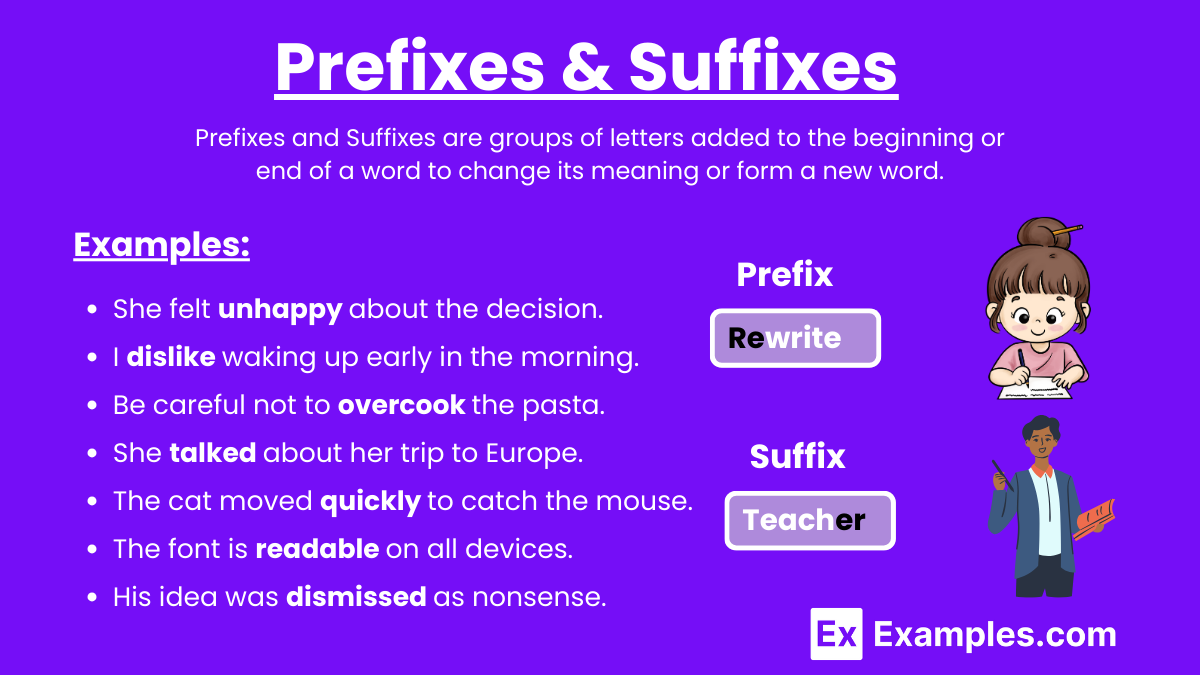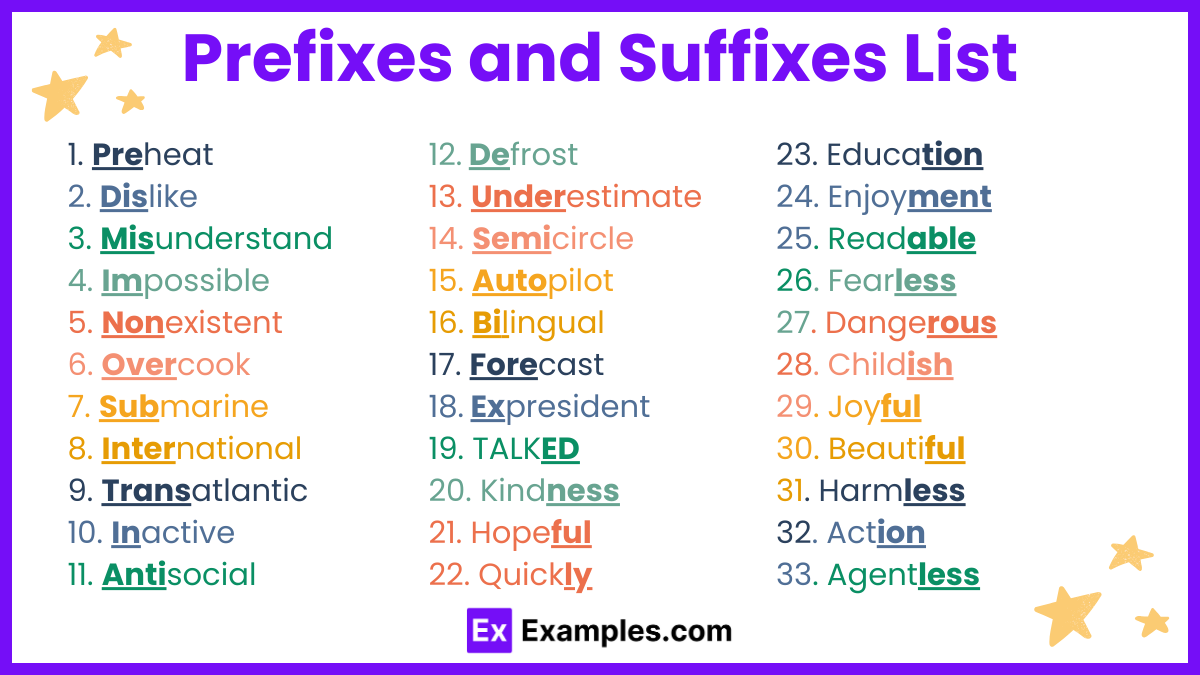Prefixes & Suffixes

Prefixes and Suffixes are groups of letters added to the beginning or end of a word to change its meaning or form a new word. A prefix is added to the start of a root word, altering its meaning, such as “un-” in “unhappy” to indicate not happy. A suffix is added to the end of a root word, often changing its grammatical function, like “-ness” in “happiness,” transforming the adjective “happy” into the noun “happiness.” Understanding prefixes and suffixes helps in decoding unfamiliar words, enhancing vocabulary, and improving language comprehension and usage.
What are Prefixes & Suffixes?
Prefixes and suffixes are sets of letters added to the beginning or end of a word to change its meaning. Prefixes (e.g., “un-” in “undo”) modify the word’s meaning, while suffixes (e.g., “-ness” in “kindness”) change its grammatical function. These elements help expand vocabulary and clarify meaning in English.
Examples of Prefixes and Suffixes
- Un-: Unhappy (not happy)
- Re-: Rewrite (write again)
- Pre-: Preheat (heat before)
- Dis-: Dislike (not like)
- Mis-: Misunderstand (understand wrongly)
- Non-: Nonexistent (not existing)
- Over-: Overcook (cook too much)
- Sub-: Submarine (underwater vessel)
- Inter-: International (between nations)
- Trans-: Transatlantic (across the Atlantic)
- -ed: Talked (past tense of talk)
- -ness: Kindness (state of being kind)
- -ful: Hopeful (full of hope)
- -ly: Quickly (in a quick manner)
- -tion: Education (the act of educating)
- -ment: Enjoyment (state of enjoying)
- -able: Readable (can be read)
- -less: Fearless (without fear)
- -ous: Dangerous (full of danger)
- -ish: Childish (like a child)
Prefix and Suffix Examples Sentence
- She felt unhappy about the decision.
- I had to rewrite my essay after receiving feedback.
- Please preheat the oven before baking the cake.
- I dislike waking up early in the morning.
- He misunderstood the instructions completely.
- The concept of ghosts is often considered nonexistent.
- Be careful not to overcook the pasta.
- The submarine explored the depths of the ocean.
- The international conference attracted delegates from around the world.
- The transatlantic flight took about eight hours.
- She talked about her trip to Europe.
- His kindness towards strangers is admirable.
- She remained hopeful despite the challenges.
- The cat moved quickly to catch the mouse.
- The school provides excellent education for its students.
- He found great enjoyment in reading books.
- The font is readable on all devices.
- The soldier was fearless in the face of danger.
- The storm created dangerous conditions on the road.
- His behavior was rather childish for his age.
- The instructions were unclear, causing confusion.
- She decided to reorganize her closet.
- He often prejudges people before getting to know them.
- The disagreement led to a heated argument.
- They had to miscalculate the total cost.
- His idea was dismissed as nonsense.
- The project is unfinished and needs more work.
- The substandard performance was disappointing.
- The interaction between the two was fascinating.
- The bridge was designed to withstand transcontinental travel.
Prefixes and Suffixes List

| Prefixes | Suffixes |
|---|
| Unhappy | Talked |
| Rewrite | Kindness |
| Preheat | Hopeful |
| Dislike | Quickly |
| Misunderstand | Education |
| Nonexistent | Enjoyment |
| Overcook | Readable |
| Submarine | Fearless |
| International | Dangerous |
| Transatlantic | Childish |
| Inactive | Joyful |
| Impossible | Beautiful |
| Antisocial | Harmless |
| Defrost | Action |
| Underestimate | Agentless |
| Semicircle | Artist |
| Autopilot | Createive |
| Bilingual | Historian |
| Forecast | Director |
| Expresident | Resistance |
| Untie | Lovable |
| Rewind | Darkness |
| Preview | Actor |
| Disconnect | Happiness |
| Misplace | Achievement |
| Nonstop | Teacher |
| Overload | Joyous |
| Substandard | Activeness |
| Interact | Bravery |
| Transfer | Brightness |
| Indirect | Eagerness |
| Imperfect | Gradual |
| Anticlimax | Happiness |
| Decode | Humorous |
| Underpay | Liveliness |
| Semiannual | Nervous |
| Autograph | Patient |
| Bifocal | Peaceful |
| Forewarn | Positivity |
| Exboyfriend | Restless |
Uses of Prefixes and Suffixes
- Change the meaning of a word: Adding a prefix or suffix can alter the meaning of the original word.
- Example: “happy” to “unhappy” (not happy)
- Indicate tense: Suffixes can modify a verb to show past, present, or future tense.
- Example: “talk” to “talked” (past tense)
- Form nouns: Adding suffixes can turn verbs or adjectives into nouns.
- Example: “kind” to “kindness” (state of being kind)
- Create adjectives: Suffixes can convert nouns or verbs into adjectives.
- Example: “hope” to “hopeful” (full of hope)
- Show opposites: Prefixes often create the opposite meaning of the root word.
- Example: “agree” to “disagree” (not agree)
- Express repetition: Prefixes can indicate that an action is repeated.
- Example: “write” to “rewrite” (write again)
- Specify number: Prefixes can denote quantity or order.
- Example: “bi-” in “bicycle” (two wheels)
- Indicate location or direction: Prefixes can suggest location or direction.
- Example: “sub-” in “submarine” (underwater vessel)
- Modify degree or size: Prefixes can change the degree or size of the word.
- Example: “over-” in “overcook” (cook too much)
- Form adverbs: Suffixes can transform adjectives into adverbs.
- Example: “quick” to “quickly” (in a quick manner)
Prefixes and Suffixes Exercises
Exercise 1: Form New Words
Create new words by adding prefixes or suffixes to the following root words.
- Happy (prefix and suffix)
- Write (prefix)
- Heat (prefix)
- Like (prefix)
- Understand (prefix)
- Exist (prefix)
- Cook (prefix)
- Marine (prefix)
- Nation (prefix)
- Atlantic (prefix)
Answers for Exercise 1:
Exercise 2: Match the Words
Match the words with their correct meanings.
- Unhappy a. Not possible
- Rewrite b. Between nations
- Preheat c. Full of hope
- Dislike d. Before heating
- Misunderstand e. Not happy
- Nonexistent f. Write again
- Overcook g. Not like
- Submarine h. Cook too much
- International i. Underwater vessel
- Impossible j. Understand wrongly
Answers for Exercise 2:
Exercise 3: Sentence Completion
Complete the sentences using the correct prefix or suffix.
- She was very ____ (happy) with her gift.
- You need to ____ (heat) the oven before baking.
- I had to ____ (write) the essay.
- He often ____ (understand) instructions.
- The project is ____ (finished).
Answers for Exercise 3:
FAQ’s
How do prefixes affect word meaning?
Prefixes modify the original word’s meaning. For example, “pre-” means before, so “preview” means to view beforehand.
How do suffixes affect word form?
Suffixes can change a word’s part of speech or meaning. For example, adding “-ly” to “quick” forms the adverb “quickly.”
Can a word have both a prefix and a suffix?
Yes, a word can have both. For instance, “unhappiness” has the prefix “un-” and the suffix “-ness.”
What are common prefixes?
Common prefixes include “un-” (not), “re-” (again), “pre-” (before), and “dis-” (opposite of).
What are common suffixes?
Common suffixes include “-ing” (action), “-ed” (past tense), “-er” (one who), and “-able” (capable of).
Are there rules for adding suffixes?
Some rules include dropping the final “e” in “love” to add “-ing” (loving) and doubling the final consonant in “plan” to add “-ed” (planned).
Can prefixes have multiple meanings?
Yes, for example, “re-” can mean “again” (redo) or “back” (return).
Are there negative prefixes?
Yes, prefixes like “un-,” “in-,” “non-,” and “dis-” create negative meanings, like “unhappy,” “incorrect,” “nonstop,” and “dislike.”
How do suffixes create nouns?
Suffixes like “-ment” (enjoyment), “-tion” (celebration), and “-ness” (kindness) turn verbs and adjectives into nouns.
How do suffixes create adjectives?
Suffixes like “-ful” (joyful), “-less” (hopeless), and “-ous” (dangerous) turn nouns and verbs into adjectives.



